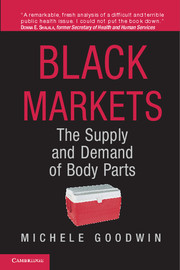Book contents
- Frontmatter
- Dedication
- Epigraph
- Contents
- Miscellaneous Frontmatter
- Preface
- Acknowledgments
- BLACK MARKETS
- PART ONE UNDERSTANDING THE STRAIN ON ALTRUISM
- PART TWO LEGAL FRAMEWORKS AND ALTERNATIVES
- 5 The Uniform Anatomical Gift Act
- 6 Presumed Consent: The Unsuspecting Donor
- 7 Commoditization: Incentives for Cadaveric Organ Harvesting
- 8 Black Markets: The Supply of Body Parts
- PART THREE CRITIQUING THE SLAVERY AND BLACK BODY MARKET COMPARISON
- Notes
- Bibliography
- Index
5 - The Uniform Anatomical Gift Act
from PART TWO - LEGAL FRAMEWORKS AND ALTERNATIVES
Published online by Cambridge University Press: 14 September 2019
- Frontmatter
- Dedication
- Epigraph
- Contents
- Miscellaneous Frontmatter
- Preface
- Acknowledgments
- BLACK MARKETS
- PART ONE UNDERSTANDING THE STRAIN ON ALTRUISM
- PART TWO LEGAL FRAMEWORKS AND ALTERNATIVES
- 5 The Uniform Anatomical Gift Act
- 6 Presumed Consent: The Unsuspecting Donor
- 7 Commoditization: Incentives for Cadaveric Organ Harvesting
- 8 Black Markets: The Supply of Body Parts
- PART THREE CRITIQUING THE SLAVERY AND BLACK BODY MARKET COMPARISON
- Notes
- Bibliography
- Index
Summary
Only a small percentage of potential donors die under circumstances that permit transplantation, particularly for organs … For organs, after the donor is declared brain-dead, the body must be kept on a respirator and life support until the organs are taken. The OPO and/or Eye/Tissue Banks are notified as required by federal law of a potential donor, and they begin developing a medical and family history to determine whether the dying or deceased person is a suitable donor.
INTRODUCTION
In 2004, an effort was underway to respond to great medical demand for organs. The National Conference of Commissioners on Uniform State Laws(NCCUSL) convened a panel of commissioners, chaired by Carlyle C. Ring, to begin retooling the Uniform Anatomical Gift Act (UAGA). On December 3, 2004, at a small hotel in Chicago, Illinois, observers, advisers, and commissioners began the process of redrafting the UAGA. Commissioners invited participation from a broad pool of specialists and interest groups, including representatives from the tissue banking industry, organ procurement organizations, UNOS, the American Medical Association (AMA), the American Bar Association (ABA), the National Association of Medical Examiners, and even funeral directors. The committee was fortunate to have one of the original drafters participate and I was more than pleased to be part of a process that was at the core of much of my research. Redrafting the UAGA is not uncomplicated exactly because there are so many distinct interests in this process and some of those are competing interests. The original UAGA was drafted and passed over a summer. The current drafting process could take 2 years.
The committee's charge is to redraft the UAGA in light of organ demand, respect for donor and family autonomy, consistency with federal laws, and with attention to clarifying ambiguities found in prior versions. The committee is also challenged to draft adaptable legislation that can address future medical and biotechnological needs. Nearly 40 years ago when the original act was drafted, neither commissioners nor federal legislators foresaw the great demand for human biological resources, nor did they predict the multitude of ways in which body parts would be used. Human genome mapping, cloning, and aggressive stem cell study were off the radar even in 1987 when the last revisions of the UAGA were adopted. The UAGA draft currently in development will serve as the third revision of the act.
- Type
- Chapter
- Information
- Black MarketsThe Supply and Demand of Body Parts, pp. 109 - 116Publisher: Cambridge University PressPrint publication year: 2006



